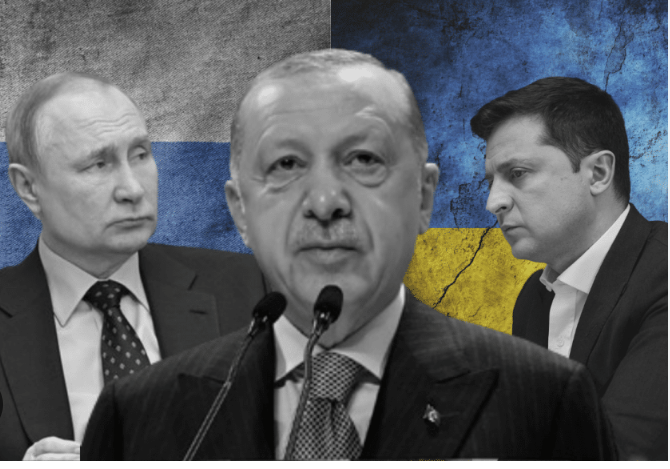In a war which may soon fall into the “war the time has forgotten” category, Turkey is staging a very delicate high-wire act between two combatants. As Ankara tires to facilitate grain imports from Ukraine through the Straits and redoubles aid to Ukrainian military, Putin’s displeasure is visible. Erdogan needs more financial aid from Russia and the approval of Western governments to rescue his belauguared economy from another winter of discontent.
Turkish Foreign Minister Hakan Fidan is scheduled to visit Ukraine next week to explore options for revitalising the grain deal suspended by Russia, according to informed sources.
The move comes as Kyiv proposes an alternative route for the transportation of agricultural products, one which would circumvent international waters.
Two sources familiar with the visit told Middle East Eye that Fidan will use his first ever visit to Kyiv as foreign minister, on 25 August, to exchange views on bilateral issues as well as the ongoing Ukrainian offensive and Ukraine’s own peace plan.
Turkish President Recep Tayyip Erdogan has repeatedly announced that he hopes to meet his Russian counterpart, Vladimir Putin, at the end of this month to make progress on resolving Moscow’s grievances with a set of proposals, as well as expanding the deal into a wider attempt to declare a ceasefire.
However, the Ukrainian government believes there is no time to lose, as the harvest season is approaching.
Last week, the Ukrainian navy announced in a formal statement that it had established temporary routes for merchant ships from Ukrainian ports in the Black Sea, namely Chornomorsk, Odessa and Pivdennyi.
A Ukrainian source familiar with the route said the ships will sail to Romanian territorial waters and then follow the route towards Istanbul via Bulgarian territorial waters.
The source acknowledged that the route was fragile, and if the Russians were determined, they could potentially target the ships. “However, we cannot remain idle,” the source emphasised.
Russian President Putin is not happy with Turkey’s deepening involvement in the Ukrainian conflict, in particular when he seems to have forged a strategy of prolonging the war until 2024 American presidential elections by destroying Ukraine’s economic viability.
Russia sent a message to Turkey when it bombed Motor Sich, say experts, according to Burak Bekdil of Defense News.
The Aug. 6 missile and drone attack across Ukraine killed six people, Kyiv officials said. Ukrainian President Volodymyr Zelenskyy said the Zaporizhzhia-based facilities of Motor Sich, which his government took over in November, also came under attack.
The privately owned business Baykar builds the Akinci and Kizilelma drones, for which Motor Sich provides engines.
Eugene Kogan, a security and defense analyst based in Tbilisi, Georgia, said Russian President Vladimir Putin was essentially telling his Turkish counterpart Recep Tayyip Erdoğan: “Despite our friendly relations and respect to each other, your son-in-law’s undertaking in Ukraine will cost him dearly” — a reference to Baykar chairman Selcuk Bayraktar, who is married to one of the Turkish president’s daughters.
Yahya Bostan, a columnist for Turkish newspaper Yeni Safak, wrote in a column on Friday that the incident was perceived in Ankara as a warning to ships travelling to Ukraine via the new temporary corridor.
Turkey begins construction of second corvette for Ukrainian Navy
In another development, likely to raise Kremlin’s ire, The New Voice of Ukraine reported:
Turkey has launched the construction of a second Ada-class corvette for the Ukrainian Navy, according to a navy spokesman on August 18.
The Ada-class is a type of missile corvette developed for the Turkish Navy. These vessels are designed for patrolling on the high seas and anti-submarine operations, and incorporate stealth technology.
The project to build two vessels of this type for Ukraine began in 2021. According to the agreement, the corvettes are expected to join the Ukrainian Navy in 2024.
Ankara is coming under growing pressure from her NATO partners and US to increase aid to Ukraine in a war of attrition which seems stuck in time, with neither side having a serious hope of winning.
Erdogan is torn. On one hand, he needs continued economic support from Putin, mainly in terms of delaying past natural gas payments due from Botas to Gasprom and potentially asking for more gas credit if prices were to rise this winter. On the other hand, he needs Western governments to bless fund managers and commercial banks to lend more generously to Turkey to survey the winter without a currency crisis. Finally, EU’s October decision about the fate of relations with Turkey could hinge on Erdogan’s continual support of Ukraine.
By Atilla Yesilada
